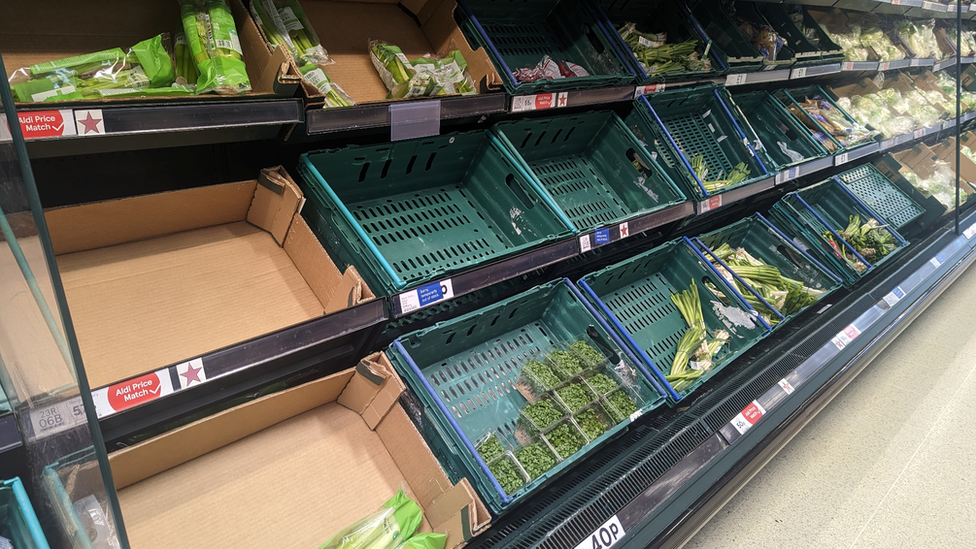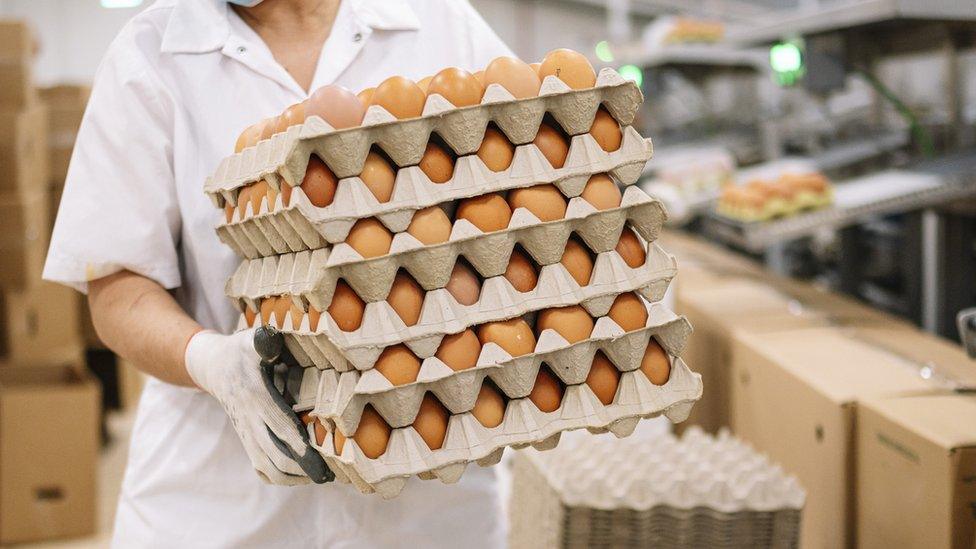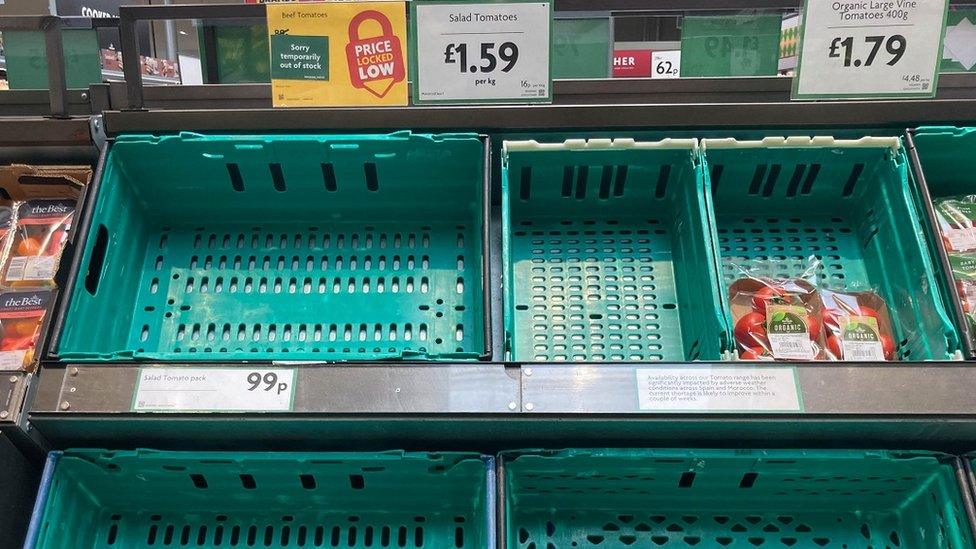Asda and Morrisons limit sales of some fruit and vegetables
- Published

Asda and Morrisons are putting limits on purchases of some fruit and vegetables as supermarkets face shortages of fresh produce.
Asda said it was capping sales of items such as tomatoes, peppers and lettuce at three each per customer.
Morrisons said limits of two on products like cucumbers would be introduced at stores from Tuesday.
However, Tesco, Sainsbury's, Lidl, Aldi, Waitrose and Marks & Spencer currently do not have limits in place.
Pictures of empty supermarket shelves have been circulating on social media, after shoppers found it hard to get some items in recent days.
The shortages - which are affecting Ireland too - are largely the result of extreme weather in Spain and north Africa, where floods, snow and hail have affected harvests.
During this time of year, a significant proportion of what the UK consumes usually comes from those regions.
The shortages are expected to last "a few weeks" until the UK growing season begins and retailers find alternative sources of supply, the British Retail Consortium (BRC) said.
Andrew Opie, director of Food and Sustainability at the trade group, added that supermarkets are "adept at managing supply chain issues" and were working with farmers to ensure the continued supply of fresh produce.
As well as tomatoes, peppers and lettuce, Asda said it was also limiting sales of salad bags, cucumbers, broccoli, cauliflowers and raspberry punnets.
"Like other supermarkets, we are experiencing sourcing challenges on some products that are grown in southern Spain and north Africa," a spokesperson said.
Morrisons said as well that cucumbers, tomatoes, lettuce and peppers were affected at its shops.
In the winter months the UK imports around 95% of its tomatoes and 90% of its lettuces, most of it from Spain and north Africa, according to the BRC.
Southern Spain has been suffering unusually cold weather and in Morocco crop yields have been affected by floods, while storms have led to ferries being delayed or cancelled.
Meanwhile in the UK and Netherlands, farmers have cut back on their use of greenhouses to grow winter crops due to higher electricity prices.
UK crops hit
Paul Smith, from wholesaler Oliver Kay, said with lower levels of planting this year, there was less surplus available to offset reduced yields elsewhere.
"Growers across the UK and Europe have been battling with severe weather conditions for a number of months now," he said.
A spell of heatwaves in June 2022 led to the fourth warmest UK summer on record and temperatures broke the 40C mark for the first time. That was followed by sharp, prolonged freezes in December.
Tim O'Malley, managing director of Nationwide Produce, one of the UK's largest fresh produce firms, has warned his customers that could mean "major shortages" in domestically grown crops too.
UK crops of carrots, parsnips, cabbage and cauliflower had been affected by the poor weather, Mr O'Malley said.
"We are about to see serious shortages and price hikes on these lines in the coming weeks and months," he said.
"The biggest issue we now have as an industry is not inflation, it's mother nature," he added.
Minette Batters, president of the National Farmers' Union, called for more support for growers, describing it as "ridiculous" that the horticulture sector was not included in the government's support scheme for energy intensive industries.
However, farming minister, Mark Spencer, said the shortages were the result of "weather events in other parts of the world" rather than the challenges facing UK producers.
Complex supply chains
Anecdotal evidence suggests the UK has been bearing the brunt of the shortages, but problems have also been reported in Ireland.
Tesco Ireland said its stock levels were temporarily affected, while the locally-owned chain SuperValu has also reported problems.
Industry sources suggested the UK may be suffering because of lower domestic production and more complex supply chains, as well as a price-sensitive market. But they said Brexit was unlikely to be a factor.
The main impact of new border procedures for fruit and vegetable imports will not be felt until January 2024 - while imports from Morocco, which is outside the EU, are already subject to border checks.
Industry sources, include wholesaler Ken Mortimer, whose firm Heritage Fine Food Company supplies restaurants and schools in the south west of England, said they did not believe Brexit was at the root of current shortages.

Have you been affected by issues raised here? Are there shortages of salad and vegetables where you are? You can get in touch by emailing haveyoursay@bbc.co.uk, external.
Please include a contact number if you are willing to speak to a BBC journalist. You can also get in touch in the following ways:
WhatsApp: +44 7756 165803, external
Tweet: @BBC_HaveYourSay, external
Or fill out the form below
Please read our terms & conditions and privacy policy
If you are reading this page and can't see the form you will need to visit the mobile version of the BBC website to submit your question or comment or you can email us at HaveYourSay@bbc.co.uk, external. Please include your name, age and location with any submission.

Related topics
- Published8 November 2022

- Published20 February 2023

